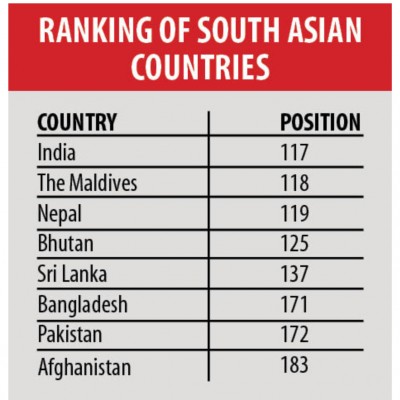Bangladesh falls two notches

Bangladesh has fallen two notches in the World Bank’s Women, Business and the Law 2020 study, meaning the country will have to go a long way in creating opportunities for them in employment and entrepreneurship.
The country’s score was slightly up to 49.4 from 49.38 a year ago on a scale of 0-100, with 100 representing the best.
The WB put Bangladesh at the 171st in this year’s ranking out of 190 economies, down from the 169th last year out of 187 nations.
Of the other South Asian countries, India was the 117th, Sri Lanka 137th and Pakistan 172nd.
The study measures the economies, tracking how laws affect women at different stages in their working lives and focusing on those laws applicable in the main business city. It covers reforms in eight areas that are associated with women’s economic empowerment, conducted from June 2017 to September 2019.
“Legal rights for women are both the right thing to do and good from an economic perspective. When women can move more freely, work outside the home and manage assets, they are more likely to join the workforce and help strengthen their country’s economies,” said World Bank Group President David Malpass in a statement.
“We stand ready to help until every woman can move through her life without facing legal barriers to her success.”
The index measures only formal laws and the regulations which govern a woman’s ability to work or own businesses – a country’s actual norms and practices are not captured. The global average score was 75.2, which improved slightly from 73.9 two years ago. Clearly, much more work remains as women in many countries have only a fraction of the legal rights of men, holding them back from opportunities for employment and entrepreneurship.
The eight areas covered by the index are structured around women’s interactions with the law through their careers: mobility, workplace, pay, marriage, parenthood, entrepreneurship, assets, and pension.
The regulatory environment for women’s economic participation has improved over the past two years, with 40 economies enacting 62 reforms that will help women – half the world’s population – realise their potential and contribute to economic growth and development, the WB said in the statement.
Still, the results are uneven — women in many countries have only a fraction of the legal rights of men, holding back their economic and social development.
Better performance in the areas measured by the Women, Business and the Law index is associated with more women in the labour force and with higher income and improved development outcomes, the WB said.
Of the 10 economies that improved the most, six are in the Middle East and North Africa, three are in Sub-Saharan Africa and one in South Asia. While there was considerable progress, the Middle East and North Africa remain the region with the most room for improvement.
Eight countries now have a score of 100, with Canada joining Belgium, Denmark, France, Iceland, Latvia, Luxembourg and Sweden due to a recent reform in parental leave.
In South Asia, four economies enacted seven reforms in four areas. Nepal introduced a new labour law that prohibits discrimination in employment, paternity leave and new pensions regulation.
Three other countries also enacted reforms: Pakistan and Sri Lanka made progress in the area of parenthood. In India, the state of Maharashtra eliminated restrictions on women’s jobs.
“This study helps us understand where laws facilitate or hinder women’s economic participation. It has incentivised countries to undertake reforms that can eliminate gender imbalances,” World Bank Group Chief Economist Pinelopi Koujianou Goldberg said.
“Achieving equality will take time, but it is encouraging that all regions have improved. We hope that this research will continue to serve as an important tool to inform policy making and level the playing field for women.”
Advanced economies continue to make progress on the indicators. Of the 40 economies with scores above 90, 27 are OECD high-income economies. The Czech Republic and the United States reformed laws related to paternity and parental leave, giving parents more opportunity to share childcare responsibilities, while Italy and Slovenia equalised pension benefits between men and women.
The areas of workplace and marriage saw many reforms, especially in the enactment of laws that protect women from violence. In the last two years, eight economies enacted legislation on domestic violence for the first time. Seven economies now have new legal protections against sexual harassment in employment, the WB said.
Twelve economies improved their laws in the area of pay, removing restrictions on the industries, jobs and hours that women can work. Globally, the most frequent reforms were in areas related to parenthood, with 16 economies enacting positive changes. Reforms included expansion of the amount of paid maternity leave available to mothers, introduction of paid paternity leave and prohibition of dismissal of pregnant employees.
